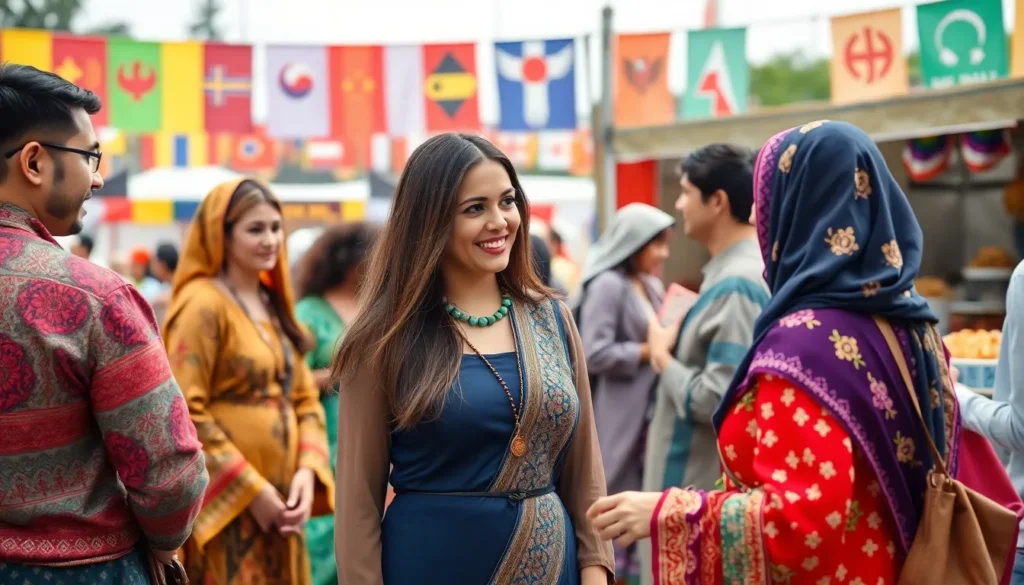In a world bursting with diverse cultures, the idea of cultural superiority often rears its head like an unwelcome party guest who insists on sharing their karaoke rendition of “My Way.” While some might strut around claiming their culture’s the best, the reality is that every culture has its quirks, charms, and yes, even its cringe-worthy moments.
Table of Contents
ToggleUnderstanding Cultural Superiority
Cultural superiority refers to the belief that one culture holds greater value or is inherently better than others. This perspective often leads to misconceptions and tensions among different cultural groups.
Definition of Cultural Superiority
Cultural superiority manifests as an assertion that certain cultural practices, beliefs, or values are superior to those of other cultures. This notion often stems from ethnocentrism, where individuals evaluate other cultures through their cultural lens. Arguments for cultural superiority may include perceived advancements in technology, social systems, or artistic achievements. Such beliefs can foster division while overshadowing the diverse strengths found in every culture. Recognizing cultural richness alongside its flaws fosters appreciation rather than competition.
Historical Context
Historical examples of cultural superiority often emerge during periods of colonization and imperialism. Colonial powers frequently deemed indigenous cultures inferior, leading to significant cultural suppression and erosion. Events such as the age of exploration exemplified this mindset, as colonizers imposed their beliefs on native populations. Resistance to cultural superiority narratives emerged in the 20th century, promoting cultural pluralism and mutual respect. Movements advocating for human rights further challenged these hierarchical views. Understanding historical roots allows for critical examination of contemporary attitudes toward cultural superiority.
Theories Supporting Cultural Superiority

Cultural superiority theories often arise from entrenched viewpoints and historical contexts. Ethnocentrism serves as a primary driver, leading individuals to evaluate other cultures based on their own biases.
Eurocentrism and Its Impact
Eurocentrism posits European culture as the benchmark for evaluating other cultures. This perspective has significantly influenced educational systems, media representations, and historical narratives. Historical colonial powers used Eurocentrism to justify imperial domination, deeming non-European cultures inferior. Consequently, many societies experienced cultural erasure and identity loss. Academic discourse recognizes this bias, urging a re-examination of history from diverse cultural perspectives. The resulting critique highlights the importance of inclusive narratives that honor all cultures’ contributions.
Modern Perspectives on Culture
Modern perspectives emphasize cultural relativism, asserting no culture holds intrinsic superiority. This view encourages appreciating diverse customs, beliefs, and values without judgment. Increasing globalization fosters cross-cultural exchanges, challenging previous notions of supremacy. Scholars advocate for cultural pluralism, demonstrating that coexistence and mutual respect enhance societal growth. Recent movements emphasize dialogue and collaboration over competition, fostering interconnectivity among cultures. Such approaches promote understanding, highlighting shared human experiences while respecting differences.
Arguments Against Cultural Superiority
Cultural superiority undermines the value and contributions of diverse cultures.
Promoting Cultural Relativism
Cultural relativism advocates understanding cultures based on their unique contexts. This approach emphasizes that beliefs and practices cannot be judged by external standards. By appreciating the diversity of cultures, individuals foster greater empathy and tolerance. Engaging with cultural relativism encourages societies to learn from different values. It also creates space for dialogue and collaboration among groups. According to anthropologists, embracing this perspective enhances mutual respect and equity. Supporting cultural relativism can lead to vibrant exchanges that enrich societies.
The Dangers of Cultural Superiority
Cultural superiority can lead to societal conflicts and tensions. Such beliefs often justify discrimination and violence against minority groups. Historical evidence shows that this mindset contributes to colonization and cultural erasure. Additionally, asserting one culture’s dominance fosters resentment and division. This narrative can also result in a lack of understanding and appreciation for diverse ways of life. By prioritizing one culture, societies risk losing valuable knowledge and creativity. Challenging cultural superiority helps build inclusive communities that celebrate diversity.
Case Studies of Cultural Superiority
Historical and contemporary examples provide insight into cultural superiority. Such case studies reveal the complex interplay of ideologies and power dynamics.
Colonialism and Its Legacy
Colonialism exemplified the belief in cultural superiority. European powers claimed dominance over various regions, often viewing indigenous cultures as inferior. This mindset justified the systematic suppression of local practices and beliefs. Colonizers imposed their languages, religions, and social structures, leading to profound cultural erasure. Evidence of resistance emerges in the form of movements aimed at preserving and revitalizing indigenous cultures. Educational and legal reforms increasingly recognize and honor the contributions of these cultures, rejecting outdated narratives. The legacies of colonialism continue to impact societies, necessitating ongoing dialogue and reparative actions.
Globalization and Cultural Exchange
Globalization fosters increased cultural exchange between societies. This interconnectedness challenges notions of cultural superiority through collaboration and shared experiences. Diverse cultural influences blend, enriching global perspectives and practices. While Western ideals often dominate, many regions actively assert their cultural identities. Cultural festivals, international art exhibitions, and culinary exchanges exemplify this dynamic interaction. Studying these exchanges promotes understanding and respect for cultural differences. In turn, globalization encourages a reevaluation of traditional hierarchies, emphasizing that no culture possesses intrinsic superiority. Embracing this complexity can lead to more equitable relationships between cultures.
Cultural superiority is a concept that has long influenced societal dynamics and relationships. By recognizing the value of all cultures and rejecting the notion that one is superior, individuals can foster a more inclusive environment. Embracing cultural relativism allows for a deeper understanding of diverse perspectives and practices.
As globalization continues to connect people across the globe, the opportunity for meaningful dialogue and collaboration grows. This shift encourages societies to celebrate diversity rather than compete over cultural hierarchies. Ultimately, dismantling the idea of cultural superiority paves the way for a richer, more equitable world where every culture’s contributions are honored and respected.





